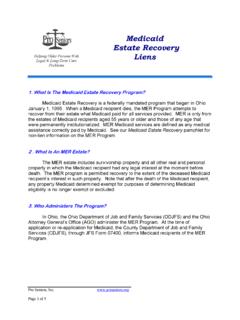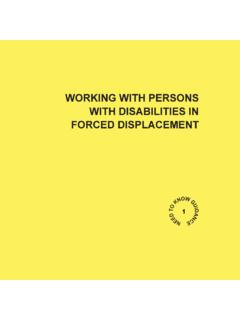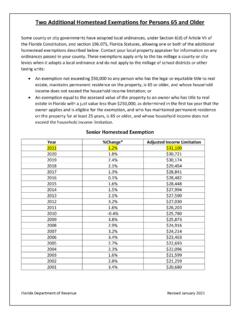Transcription of Older peOple in emergencies: cOnsideratiOns fOr …
1 Older peOple in emergencies: cOnsideratiOns for action and policy development David Hutton Cover photo: Vidarshi de S Wijayeratna/HelpAge International; photo opposite left: WHO/Bower; photo opposite right: WHO. Acknowledgements: This publication was developed by the Department of Ageing and Life Course (ALC). under the direction of Alexandre Kalache and Louise Plouffe. ALC is grateful to David Hutton for preparing this report and to the Public Health Agency of Canada for seconding him to the World Health Organization for this purpose and for supporting the production of the report. The report benefited from the guidance of the following project advisers: Bill Gray, Emergencies Manager, HelpAge International, UK; Michael Lake, CEO, Help the Aged UK; and Nabil Kronful, President, Lebanese Health Care Management Association.
2 Production of the report was coordinated by Nejma Macklai (ALC) in close collaboration with Nada Al Ward from WHO/HAC and Carla Salas-Rojas (ALC). WHO Library Cataloguing-in-Publication Data Older peOple in emergencies : cOnsideratiOns for action and policy development / David Hutton. services for the aged. medical services. disasters. groups. policy. , David. Health Organization. Ageing and Life Course Unit. ISBN 978 92 4 154739 0 (NLM classification: WT 31). World Health Organization 2008. All rights reserved. Publications of the World Health Organization can The mention of specific companies or of certain manufacturers'. be obtained from WHO Press, World Health Organization, 20 Avenue products does not imply that they are endorsed or recommended by Appia, 1211 Geneva 27, Switzerland (tel.)
3 : +41 22 791 3264; fax: +41 the World Health Organization in preference to others of a similar nature 22 791 4857; e-mail: Requests for permission that are not mentioned. Errors and omissions excepted, the names of to reproduce or translate WHO publications whether for sale or for proprietary products are distinguished by initial capital letters. noncommercial distribution should be addressed to WHO Press, at the above address (fax: +41 22 791 4806; e-mail: All reasonable precautions have been taken by the World Health Organization to verify the information contained in this publication. The designations employed and the presentation of the material in However, the published material is being distributed without warranty this publication do not imply the expression of any opinion whatsoever of any kind, either expressed or implied.)
4 The responsibility for the on the part of the World Health Organization concerning the legal interpretation and use of the material lies with the reader. In no event status of any country, territory, city or area or of its authorities, or shall the World Health Organization be liable for damages arising from concerning the delimitation of its frontiers or boundaries. Dotted lines its use. on maps represent approximate border lines for which there may not yet be full agreement. The named author alone is responsible for the views expressed in this publication. ii < Printed in France Older peOple in emergencies: cOnsideratiOns for action and policy development David Hutton Ageing and Life Course (ALC).
5 Family and Community Health (FCH). Emergency Preparedness and Capacity Building (EPC). Health Action in Crisis (HAC). References Box 1. Lesson from France: the 2003 heat wave Box 2. Learning from Older peOple : the Kobe earthquake Box 3. The Kobe earthquake: after the shock Box 4. Addressing Older peOple 's needs in West Darfur Box 5. Surviving AIDS and poverty in Swaziland Box 6. The aftermath of the 2004 Indian Ocean tsunami Box 7. The tsunami's impact on women Box 8. Building local capacity after floods in Mozambique Box 9. Working with and learning from Older peOple in Lebanon Box 10. Social protection in Zambia: a self-help approach Box 11. Human rights and Older peOple Kate Holt/HelpAge International iv <.
6 ContentS. 1. Introduction 1. 2. Vulnerability and health in emergencies 5. 3. Economic marginalization 11. 4. Social disintegration and marginalization 13. 5. The issue of gender 17. 6. Capacity and consultation 21. 7. Policy and programME implications 23. 8. Preparedness phase 29. Objective 1: Increase visibility and raise awareness among health agencies and humanitarian organizations of Older peOple 's needs and priorities in emergencies. Objective 2: Develop essential medical and health resources for Older peOple in emergency practices. Objective 3: Develop emergency management policies and tools to address Older peOple 's health-related vulnerabilities. 9. Emergency response and operations phase 31.
7 Objective 1: Ensure that Older peOple are aware of and have access to essential emergency health care services. Objective 2: Provide age-sensitive and appropriate health and humanitarian services to maintain Older peOple 's health. Objective 3: Promote cross-sectoral planning and coordination to raise awareness of Older peOple 's needs in crises and reduce their risk of marginalization and deteriorating health in emergencies. 10. Recovery and transition phase 33. Objective 1: Build institutional capacity and commitment to ensuring the health and safety of Older peOple in emergencies. Objective 2: Strengthen the capacity of ministries of health and health care systems to meet the needs of Older peOple in emergencies.
8 Objective 3: Develop mechanisms to ensure continuing development and exchange of expertise as these relate to Older peOple in emergencies. Objective 4: Promote active ageing as a strategy to reduce vulnerability and develop resiliency to disasters. References 37. John Cobb/HelpAge International 1. Introduction Older people1 have often been overlooked in disasters and conflicts, and their concerns have rarely been addressed by emergency programmes or planners. This analysis seeks to: (1) highlight factors that particularly affect Older peOple in emergencies, especially health-related concerns;. (2) propose a strategy to raise awareness about Older peOple in emergencies; and (3) recommend policies and practices to address these cOnsideratiOns .
9 Until recently, Older peOple 's needs in disasters and conflicts were addressed only by broader adult health and humanitarian programmes. This has changed as several recent emergencies highlighted this population's vulnerabilities. Of the 14 800 deaths in France during the 2003. heat wave, 70% were of peOple over 75 years (1). Of the estimated 1330 peOple who died in the wake of Hurricane Katrina, most were Older persons. In Louisiana, 71% of those who died were Older than 60 years; 47% of this group were over 77 years old (2). Worldwide, the United Nations High Commissioner for Refugees (UNHCR) has estimated that Older persons make up of the overall refugee population, and in some cases comprise more than 30%.
10 Of caseloads (3). In 2005, approximately million peOple over the age of 60 were living as refugees or internally displaced persons (4). Globally, the proportion of Older peOple is growing faster than any other age group. In 2000 one in ten, or about 600 million, peOple were 60 years or Older . By 2025, this figure is expected to reach billion peOple , and in 2050 around billion. In developing countries, where 80% of Older peOple live, the proportion of those over 60 years old in 2025 will increase from 7% to 12%. Moreover, life expectancy at birth has increased globally from 48 years in 1955 to 65 in 1995, and is projected to reach 73 in 2025 (5). By 2050, peOple over 80 years old are expected to account for 4% of world's population, up from 1% today (6, 7; Wells, 2005).















